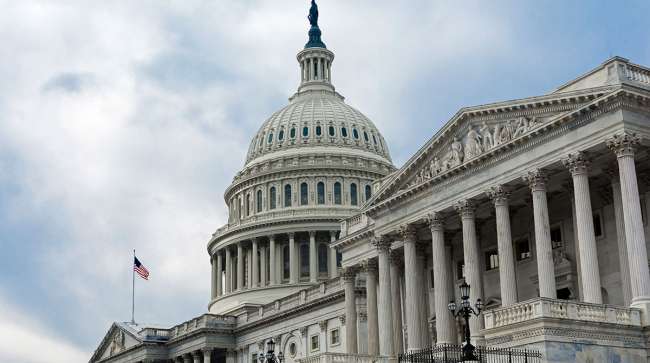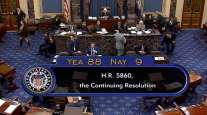Senior Reporter
Extension Allows Fiscal 2023 Funding Negotiations to Continue on Capitol Hill

[Stay on top of transportation news: Get TTNews in your inbox.]
Congress intends to work on fiscal 2023 funding legislation through the end of the month.
The Senate on Dec. 15 approved legislation to fund the government through Dec. 23 by a vote of 71-19 to avert a federal shutdown. The House approved this short-term bill Dec. 14, mostly along party lines. Federal funding authority was to have expired Dec. 16.
Congressional leaders indicated that giving themselves an additional week of work during the post-election lame duck session helps to allow them to complete a final fiscal 2023 multibill omnibus package. In recent years, Congress’ practice has been to extend self-imposed deadlines on must-pass federal legislation.
A continuing resolution, the alternative to a fiscal 2023 omnibus bill, is not endorsed by key funding negotiators on Capitol Hill.

DeLauro
“I am encouraged by the agreement we have reached on a framework that provides a path forward to enact an omnibus next week. The House and Senate Appropriations Committees are working around the clock to negotiate the details of spending bills that will be supported by the House and Senate,” House Appropriations Chairwoman Rosa DeLauro (D-Conn.) said Dec. 14.
On the Senate side, Appropriations Committee ranking member Sen. Richard Shelby (R-Ala.) also expressed optimism.

Shelby
“I am pleased to confirm that [Appropriations Committee] Chairman [Patrick] Leahy, Chair DeLauro and I have reached a bipartisan, bicameral framework that allows us to begin the difficult work of reaching agreement across twelve separate bills,” he said. “If all goes well, we should be able to finish an omnibus appropriations package by Dec. 23.”
House Republicans, who will govern in the majority as of January, are pushing for funding negotiations to pause until early next year when they control the chamber.
“I am very disappointed that we are once again discussing a [continuing resolution] because full-year appropriations bills have not been signed into law,” observed Rep. Kay Granger (R-Texas), the panel’s ranking member. In a separate part of her statement, she added, “We should be passing a continuing resolution into next year instead of buying more time to rush through a massive spending package.”
We should be passing a continuing resolution into next year instead of buying more time to rush through a massive spending package.
Rep. Kay Granger (R-Texas)
Image
Specific to transportation, congressional leaders argue a continuing resolution would slow down funding increases approved for the $1 trillion Infrastructure Investment and Jobs Act. Several transportation stakeholders are pressing Congress to approve the fiscal 2023 funding legislation to avoid potential disruptions to the IIJA.
The White House, which is requesting additional aid for Ukraine, is endorsing a fiscal 2023 omnibus package. Press secretary Karine Jean-Pierre told reporters Dec. 13, “There’s enough time to get this done. This is not a partisan issue. We’re talking about bipartisan issues here.”

Host Michael Freeze relays the story of a cybersecurity crisis at a transportation and supply chain management company and discusses strategies to avoid cyberattacks with a 30-year veteran of automotive cybersecurity systems. Hear a snippet, above, and get the full program by going to RoadSigns.TTNews.com.
The omnibus would avert shutdowns for most federal operations. Agencies at the Department of Transportation, for instance, would be backed by the comprehensive funding bill.
Before the lame duck session, Senate Democrats previewed a proposal for transportation programs. A fiscal 2023 legislation proposal they unveiled would dedicate $367.5 million for the safety operations and programs division at the Federal Motor Carrier Safety Administration. For FMCSA’s safety grants division, senators called for $506.1 million. That proposal matched House-passed funding levels as well as the White House’s budget request for the fiscal year.
In addition to the robust debate on federal funding, on the radar during the lame duck session is must-pass policy legislation linked to Department of Defense operations.
Want more news? Listen to today's daily briefing below or go here for more info:





